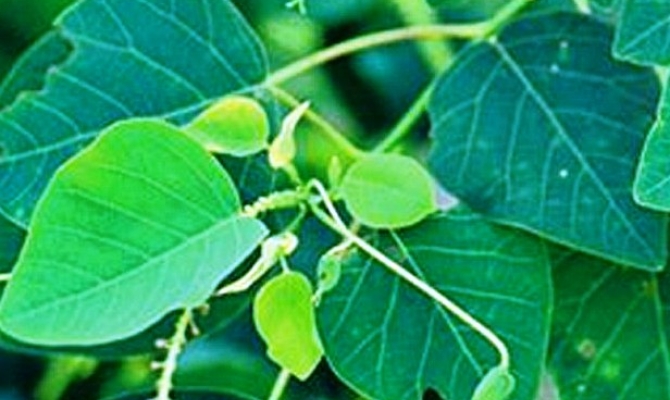
Island and Ocean Ecosystems
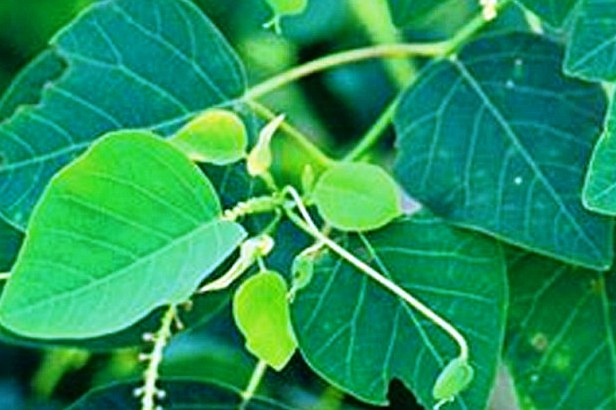 The Mamala Tree in Samoa, the bark of which contains prostratin that may help lead the fight to eradicate AIDS
The Mamala Tree in Samoa, the bark of which contains prostratin that may help lead the fight to eradicate AIDSFederated States of Micronesia, Fiji, Samoa and Vanuatu will be attending this meeting on a Protocol that provides a transparent legal framework for the effective implementation of fair and equitable sharing of benefits that arise from the use of genetic resources.
While only four Pacific island countries are party to the Nagoya Protocol, there is keen interest from others to ratify.
"Palau has started a small working group to review documents such as national policies in relation to the Protocol, we have also looked at the work undertaken by Vanuatu in ratifying and are learning from them," said Mr. Joe Aitaro of Palau.
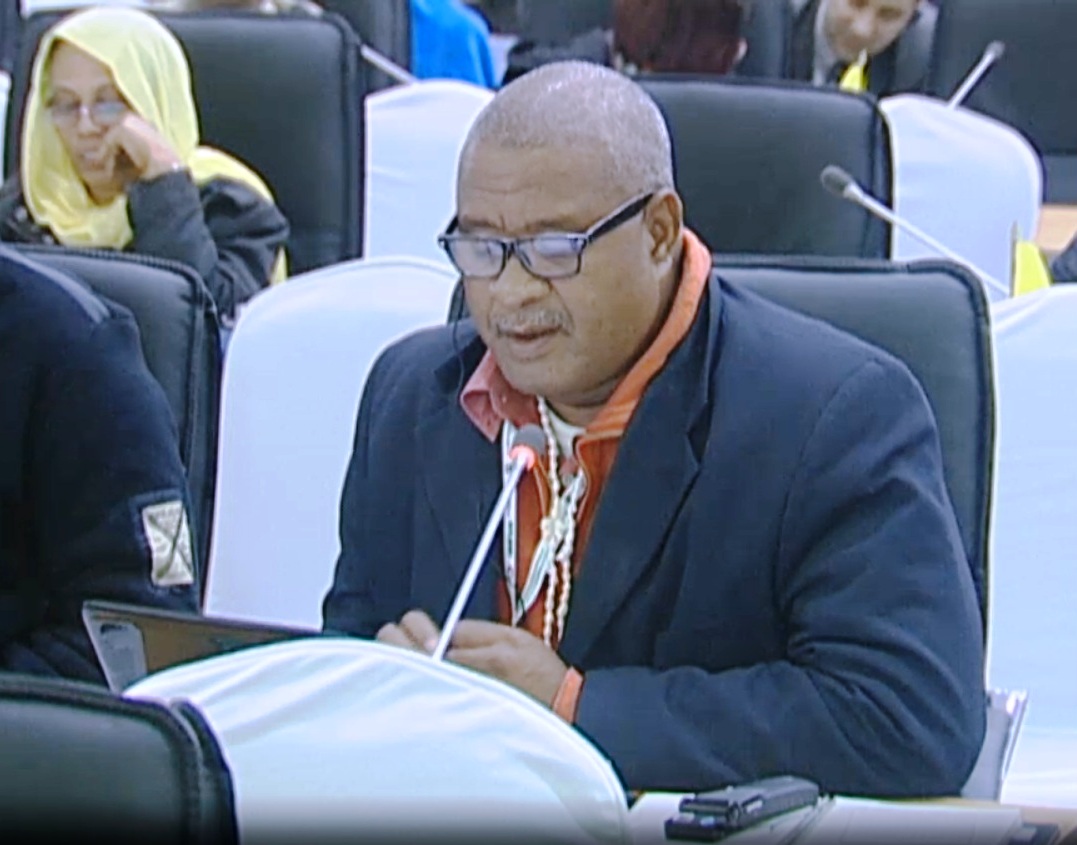 Mr. Joe Aitaro, Palau
Mr. Joe Aitaro, Palau"We share the views of other Pacific island colleagues that this is an important Protocol, we want to make sure the benefits that come from use of our genetic resources reach the Palauan people and communities."
The Protocol helps establish conditions for access to genetic resources as well as helping to ensure benefit-sharing with genetic resources leave the country that provides them. This also includes the traditional knowledge associated with genetic resources that are covered by the Convention on Biological Diversity and the benefits that come from their use.
Palau is a hotspot for marine researchers, with one organisation currently collecting and sending samples of marine corals overseas in the hope of identifying a source for cancer treatment, this is one example Aitaro cites as relevant under the Nagoya Protocol.
"When we first adopted the Nagoya Protocol in 2010 I was skeptical that we would ever get the 50 parties to ratify it, which would bring it into force," said Aitaro.
"But now it has over 50 parties, this is a monumental occasion and Palau wants to be part of this, we are making efforts to come closer to ratifying this Protocol."
The Cook Islands is also yet to ratify the Nagoya Protocol however the principals of the Protocol, Access and Benefits Sharing, are in action.
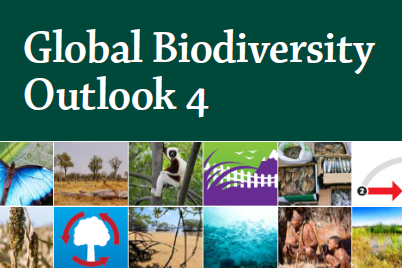
Featured in the 4th Edition of the Global Biodiversity Outlook, the Cook Islands showcases an example of an Access and Benefit sharing agreement. This provides benefits to indigenous and local communities from the development of products and services derived from the use of their traditional knowledge concerning local plant and animal species.
Dr Graham Matheson, a medical researcher from the Cook Islands, observed the traditional application of plant-based extracts for treatment of bone fractures and other medical and therapeutic applications, by members of his community, friends and family.
In 2003 he developed a proposal for the investigation and potential commercialisation of medical and therapeutic remedies and cosmetic applications based on those plant extracts and reached a benefit-sharing agreement with the recognised indigenous representative body—the Koutu Nui. This led to the establishment of the company 'CIMTECH' which incorporates the Koutu Nui as a shareholder.
The Koutu Nui shareholding value is estimated to be at least $150,000. The research income to CIMTECH includes: $264,000 in grants received from the Australian Government, and $74,000 from University of New South Wales. It also includes employment of 12 people on a part time basis in the Cook Islands, $560,000 in pre-seed investment in 2010 and a further $800,000 in 2011 for research and development.
The project is expected to contribute to the local economy through the laboratory and processing facility in Rarotonga, as well as through sales, marketing and tourism, including use of products in spas and hotels.
Matheson and CIMTECH have filed for a number of patents covering three distinct areas: bone and cartilage treatment, wound healing, and skin care treatments. Preliminary production and processing of essential oil solutions has begun and a skincare line called "Te Tika" has been launched.
Fiji, one of the four Pacific island countries that have ratified the Nagoya Protocol, has also worked within the principals of Access and Benefit Sharing well before the Protocol came into force.
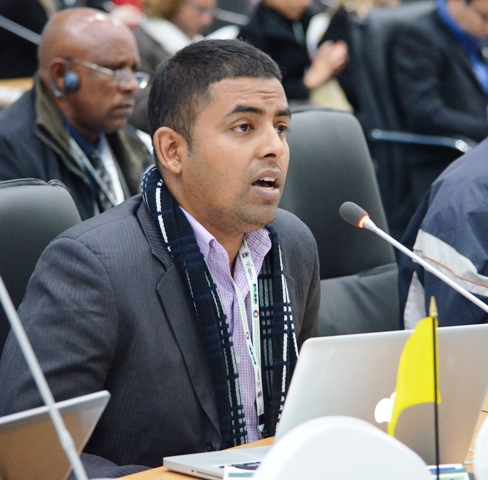
Mr Rahul Chand, Fiji
"Fiji has continuously tried to ensure that our local communities receive fair and equitable share of benefits arising from the use of biological resources. We have been working closely with Ministry of I-Taukei affairs long before the Nagoya Protocol," said Mr. Rahul Chand of the Department of Environment, Fiji.
"Therefore the Nagoya Protocol was a very encouraging step for Fiji to accede to because of national interest in these issues and ensuring that local communities receive benefits from use of their traditional knowledge and genetic resources."
The Ministry of I-Taukei Affairs undertook its extensive consultations to compile Traditional Knowledge and Expressions of Culture Policy, which looked at addressing access to genetic resources and benefit sharing issues. The draft policy is now before the Office of Attorney General in Fiji for further consultations before it can be adopted.
With the Nagoya Protocol ratified by Fiji the next step involves determining the national focal point, the national authority responsible for the Protocol, prior informed consent and working with bio prospectors and communities to undertake benefit sharing agreements.
The Secretariat of the Pacific Regional Environment Programme (SPREP) is also working with partners to help support Pacific island countries with implementing the Nagoya Protocol. There are two main projects now in the process of being rolled out in the Pacific region through a series of workshops and activities - the Access and Benefits Sharing Capacity Development Initiative in partnership with GIZ and the Global Environment Facility Project to assist with the ratification and implementation of the Nagoya Protocol in the Pacific.
The First Meeting of the Parties to the Nagoya Protocol will discuss a number of issues related to the entry into force of the Protocol including: the access and benefit-sharing clearing-house (ABS-CH); model contractual clauses; voluntary codes of conduct; awareness-raising; the need for and modalities of a global multilateral benefit-sharing mechanism; cooperative procedures and institutional mechanisms to promote compliance and to address cases of non-compliance; guidance on resource mobilization for the implementation of the Nagoya Protocol; and guidance to the financial mechanism.
"Fiji has continuously tried to ensure that our local communities receive fair and equitable share of benefits arising from the use of biological resources. We have been working closely with Ministry of I-Taukei affairs long before the Nagoya Protocol," said Mr. Rahul Chand of the Department of Environment, Fiji.
"Therefore the Nagoya Protocol was a very encouraging step for Fiji to accede to because of national interest in these issues and ensuring that local communities receive benefits from use of their traditional knowledge and genetic resources."
The Ministry of I-Taukei Affairs undertook its extensive consultations to compile Traditional Knowledge and Expressions of Culture Policy, which looked at addressing access to genetic resources and benefit sharing issues. The draft policy is now before the Office of Attorney General in Fiji for further consultations before it can be adopted.
With the Nagoya Protocol ratified by Fiji the next step involves determining the national focal point, the national authority responsible for the Protocol, prior informed consent and working with bio prospectors and communities to undertake benefit sharing agreements.
The Secretariat of the Pacific Regional Environment Programme (SPREP) is also working with partners to help support Pacific island countries with implementing the Nagoya Protocol. There are two main projects now in the process of being rolled out in the Pacific region through a series of workshops and activities - the Access and Benefits Sharing Capacity Development Initiative in partnership with GIZ and the Global Environment Facility Project to assist with the ratification and implementation of the Nagoya Protocol in the Pacific.
The First Meeting of the Parties to the Nagoya Protocol will discuss a number of issues related to the entry into force of the Protocol including: the access and benefit-sharing clearing-house (ABS-CH); model contractual clauses; voluntary codes of conduct; awareness-raising; the need for and modalities of a global multilateral benefit-sharing mechanism; cooperative procedures and institutional mechanisms to promote compliance and to address cases of non-compliance; guidance on resource mobilization for the implementation of the Nagoya Protocol; and guidance to the financial mechanism.